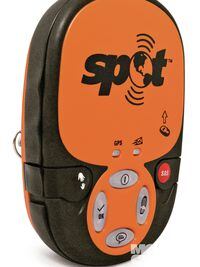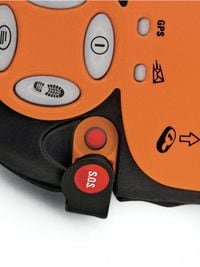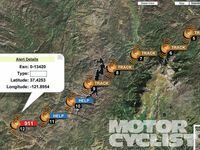Let’s say you’re somewhere 4.5 miles east of nowhere when things go seriously pear-shaped. Broken bike. Beat-up body. No cell-phone reception and nobody around to send for help. Now what? With one of these cell-phone-sized orange friends in your pocket, just push the appropriate button and relief is on its way. The SPOT Satellite Messenger is what’s commonly known as a personal locator beacon, designed to summon aid from places conventional communication can’t reach.
For something less than a life-and-death situation, the Help button transmits your GPS coordinates to your emergency contacts via text message and e-mail—accurate plus or minus 20 feet based on our testing. Contracted professional services are notified as well. That info goes out every 5 minutes for an hour or until you cancel it.
In genuinely dire circumstances, the SOS button sends your message and coordinates to the GEOS International Emergency Response Coordination Center, where it’s relayed to the emergency personnel best suited to your position and situation. That might be any agency from the local police to the local U.S. consulate if you’re in some nasty jam overseas. SPOT claims more satellites in its SOS network than anyone else in the business, allowing the receiver to get a fix and get the word out when speed counts most.
When all’s well, the OK button sends a pre-programmed thumbs-up text/e-mail message to reassure everybody back at the ranch. Or send a different note by holding down the Custom Message button. Changing messages or contacts is as easy as logging onto the SPOT website and typing. All that will cost you $99 for a year of basic SPOT service, plus $169.99 for the GPS Messenger.
Engineered to withstand temperatures from -20 to 140 degrees Fahrenheit, the 5.2-ounce unit is tougher than anybody here. It’s quite waterproof as well. After nearly a year of being dropped on concrete floors and bouncing around in tankbags and jacket pockets from Los Angeles to Marrakesh, our SPOT is still accurate and bulletproof. Though we’ve never needed to call for help, we know a few off-road types who have. In one instance, the search-and-rescue helicopter was lifting off with an injured rider less than 30 minutes after a friend hit SOS.
It’s not perfect. As with any GPS receiver, you need a clear shot at those satellites. The Messenger can have a hard time finding itself under heavy tree cover or in a narrow, rocky ravine. Power comes from three AAA Energizer Ultimate Lithium batteries, which should last about three months, though we like to carry an extra set just in case. Even if you never send for help, just knowing you could is worth far more than the initial investment. SPOT offers various alternatives, including the Connect, which lets a Smartphone talk to communication satellites when you’re riding off the grid. We like the Messenger for motorcycle use. On a solo reconnoiter to the middle of nowhere, it means one less thing to worry about. And that, as they say, is priceless.













/cloudfront-us-east-1.images.arcpublishing.com/octane/QCZEPHQAMRHZPLHTDJBIJVWL3M.jpg)
/cloudfront-us-east-1.images.arcpublishing.com/octane/HXOUJXQWA5HBHGRO3EMJIGFMVI.jpg)

/cloudfront-us-east-1.images.arcpublishing.com/octane/3TIWWRV4JBBOLDVGRYECVVTA7Y.jpg)
/cloudfront-us-east-1.images.arcpublishing.com/octane/KIX5O23D5NAIBGFXBN3327DKZU.jpg)
/cloudfront-us-east-1.images.arcpublishing.com/octane/7GJYDUIPXRGMTMQKN6ONYOLBOU.jpg)
/cloudfront-us-east-1.images.arcpublishing.com/octane/MUQLOVLL2ZDGFH25ILABNBXKTI.jpg)
/cloudfront-us-east-1.images.arcpublishing.com/octane/TNOU5DNE2BC57MFPMGN2EIDXAM.jpg)
/cloudfront-us-east-1.images.arcpublishing.com/octane/GTCXACQGJ5HAPDTGWUQKDEH44E.jpg)
/cloudfront-us-east-1.images.arcpublishing.com/octane/S35YGSEMEZB4BLTDJTSZPF4GLA.jpg)
/cloudfront-us-east-1.images.arcpublishing.com/octane/5UOT6HPX2JFMRJAX6EH45AR4MQ.jpg)
/cloudfront-us-east-1.images.arcpublishing.com/octane/OKWOJWAKP5EP3OACCRRWPCIX2Q.jpg)
/cloudfront-us-east-1.images.arcpublishing.com/octane/2WF3SCE3NFBQXLDNJM7KMXA45E.jpg)
/cloudfront-us-east-1.images.arcpublishing.com/octane/G4MG6OUCJNBSHIS2MVVOTPX65E.jpg)
/cloudfront-us-east-1.images.arcpublishing.com/octane/IIGGWFOTOJGB7DB6DGBXCCMTDY.jpg)
/cloudfront-us-east-1.images.arcpublishing.com/octane/QSTCM6AVEZA5JJBUXNIQ3DSOF4.jpg)
/cloudfront-us-east-1.images.arcpublishing.com/octane/B6XD6LS6IVCQPIU6HXDJSM3FHY.jpg)
/cloudfront-us-east-1.images.arcpublishing.com/octane/ICL63FEDDRDTTMINYICCEYGMDA.jpg)
/cloudfront-us-east-1.images.arcpublishing.com/octane/FCGZHQXRBZFLBAPC5SDIQLVF4I.jpg)
/cloudfront-us-east-1.images.arcpublishing.com/octane/WNOB6LDOIFFHJKPSVIWDYUGOPM.jpg)

/cloudfront-us-east-1.images.arcpublishing.com/octane/X33NU3E525ECRHXLNUJN2FTRKI.jpg)
/cloudfront-us-east-1.images.arcpublishing.com/octane/6KKT5NNL2JAVBOXMZYS5ZO76YA.jpg)
/cloudfront-us-east-1.images.arcpublishing.com/octane/J5RKG5O455GMPGQRF2OG6LRT7A.jpg)